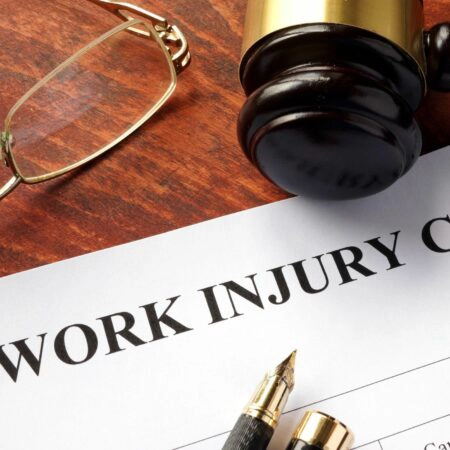If you drive a truck for a living, you put your life on the line every time you get behind the wheel. According to the National Safety Council, California sees more fatal truck accidents each year than any other state except for Texas.
Truck drivers transport 70% of all goods, and without these skilled drivers, the U.S. economy would crumble. Unfortunately, many of these truckers suffer serious injuries each year — and they often struggle to access trucking accident workers’ compensation.
Just like any other worker, professional truck drivers are legally entitled to medical benefits, disability benefits, and other forms of coverage after a trucking injury. To discuss your options in more detail, book a consultation with trucking accident workers’ compensation attorney James Koh today.
What Does Workers’ Compensation For Trucking Accidents Cover?
Workers’ compensation covers various benefits in California:
Medical Benefits
First and foremost, your workers’ compensation claim should cover all of your medical expenses. This includes emergency treatment, emergency transport, hospital treatment, surgeries, doctor appointments, rehabilitation, and even counseling sessions.
You can also receive compensation for transport costs after driving yourself to doctor appointments.
Disability Benefits
Disability benefits cover two-thirds of your lost income, up to a certain maximum. The maximum amount fluctuates based on inflation. In 2024, it was about $1,600 per week.
Although these disability payments benefits will stop when you return to work, they can continue if you suffer a permanent disability.
Supplemental Job Displacement Benefits
Some truck drivers may also qualify for supplemental job displacement benefits. This covers the cost of recertification and re-training if you need to explore alternative career paths due to the nature of your injury.
Death Benefits
If your loved one died while driving a commercial truck, you may be entitled to death benefits.
Workers’ compensation can cover funeral costs and future missed income. Depending on how many dependents a commercial truck driver leaves behind, death benefits can be worth over $300,000 in California.
Common Causes of Truck Drivers’ Injuries
Truck drivers are vulnerable to a range of injuries. Although some hazards are somewhat obvious, others are more subtle:
Repetitive Strain Injuries
The monotonous nature of truck driving can easily lead to repetitive strain injuries (RSIs). Simply gripping a steering wheel for hours on end may cause the joints and ligaments to gradually degenerate over time.
Truck drivers may also struggle with various back problems after sitting for long periods throughout each work day. According to the Occupational Health and Safety Administration (OSHA), strains and sprains represent 50 percent of all trucker injuries.
Collisions
A collision is perhaps the most obvious source of a trucking injury. Whether drivers crash into other vehicles or simply veer off the road, they may suffer fractures, lacerations, burns, traumatic brain injuries (TBIs), organ damage, and many other injuries. Sadly, many truck collisions prove fatal.
Slips and Falls
Truckers are also vulnerable to slips, trips, and falls — and this is the top cause of all workplace injuries in the United States.
A trucker might slip and fall while disembarking from their vehicle. They might also trip while assisting with unloading or loading processes. Simply walking across a parking lot can be hazardous in low-light or slippery conditions.
Falls can lead to head injuries, fractures, sprains, strains, and many other injuries.
Struck-By Accidents
“Struck-by” accidents are common sources of trucking injuries. For example, a forklift might strike a trucker during the loading process. Another example of a struck-by accident might involve a crate falling onto a trucker during the unloading process.
Safety Violations
Many truck injuries stem from safety violations. For example, your employer might have denied your request to pull over in extreme weather — instructing you to continue driving despite obvious wind or visibility risks.
According to OSHA, many accidents in the trucking industry are caused by unsafe or poorly maintained forklifts. Another common safety violation is the lack of proper guardrails on loading docks.
Overexertion
Driving a truck is a physically demanding task. According to the Federal Motor Carrier Safety Administration, a trucker is legally allowed to drive for up to 14 hours per day.
Fatigue can increase the chances of accidents — and many employers pressure truckers to drive for long shifts without adequate breaks.
What Type of Injuries Qualify for Truck Workers’ Compensation Benefits?
You can pursue workers’ compensation for virtually any injury in California — as long as it occurred while you were engaged in job-related duties. You can pursue compensation for a traumatic injury caused by a single event, or a repetitive strain injury caused by gradual wear and tear.
You do not need to point to one specific crash or incident in order to file a valid claim. In California, truckers may also file workers’ compensation claims for purely psychological injuries — such as PTSD.

Do Truck Drivers Qualify for Workers’ Compensation Benefits?
Some truckers may not qualify for workers’ compensation benefits in California. Perhaps most notably, independent contractors cannot file workers’ compensation claims, as only “employees” are covered.
Unfortunately, many truckers operate as independent contractors — especially those who own their own trucks. However, it may still be possible to file a workers’ compensation claim if your employer unlawfully misclassified you as an independent contractor. A qualified lawyer may be able to show that you should have been classified as an employee instead.
In addition, your claim may be denied if there is evidence you were intoxicated at the time of your accident. Keep in mind that the definition of “impairment” is quite broad, and it may include the effects of legal prescription drugs. If you fail a drug or alcohol test after a truck accident, for example, it may be difficult to pursue a workers’ compensation claim.
Remember: Workers’ compensation is only one potential source of coverage. You might also turn to your commercial drivers’ insurance policy.
Alternatively, you could file a personal injury lawsuit in California if your injuries were caused by a negligent third party. For example, you might sue a drunk driver for causing your truck accident, even if you do not qualify for workers’ compensation.
You can discuss potential sources of compensation in more detail during a consultation with a truck accident workers’ comp lawyer.
Filing a Truck Accident Workers’ Compensation Claim
The first step in filing a truck accident workers’ compensation claim is simple: Seek immediate medical attention.
If you’re not sure how bad your injuries are, it’s best to get an official diagnosis from a licensed doctor. When you obtain proper treatment, you’ll create clear evidence of your injuries in the form of medical records. You can then use these records to prove the legitimacy and severity of your injuries.
Once your condition has stabilized, you and your attorney should draft an official accident report. With your lawyer’s approval, hand this report to your employer, and be sure to follow your company’s unique injury reporting policies.
After filling out form DWC-1, you will need to wait for insurers to respond. They may deny your claim, but you can still appeal this decision with help from your lawyer.
If all goes well, you should receive compensation for your missed wages and medical expenses within a relatively short time frame.

Need Trucking Accident Workers’ Compensation? Contact James Koh
No amount of online research will cover your medical bills and lost wages, and your next step should be to speak with a qualified workers’ comp attorney. During a consultation with James Koh, you can discuss your unique situation in more detail. Reach out today to get started.
Frequently Asked Questions

If I am injured in a highway accident, are my medical bills covered under my own car insurance policy?
Truckers may pursue different sources of compensation after accidents, and two potential options are auto insurance and workers’ compensation.
While workers’ compensation is a “no-fault” system, auto injury lawsuits operate under an “at-fault” system in California. In other words, you would need to prove someone else caused your accident in order to cover your medical bills via an auto injury lawsuit.
Who is covered by workers’ compensation?
In California, all eligible employees are covered by workers’ compensation. This excludes independent contractors — and many truck drivers fall into this category. Even if you are classified as an “employee” under California law, insurers may reject your workers’ comp claim if you were intoxicated at the time of the accident.
What kinds of benefits are available to injured truckers?
Trucking accident workers’ compensation claims provide medical benefits and disability benefits. In some cases, they may also cover supplemental job displacement benefits.
Does it matter who was at fault in order to file a workers’ compensation claim?
In California, workers’ compensation is a “no-fault” insurance system. You do not need to prove fault in order to successfully file a workers’ compensation claim. That being said, you may need to prove fault if you pursue additional compensation via third-party claims.
Contact Us
If you or a loved one have been injured in an accident, whether at work or elsewhere, contact us to handle your personal injury and workers’ compensation claims.